| Listing 1 - 10 of 53 | << page >> |
Sort by
|
Book
ISBN: 3525531273 9783525531273 9783647531274 Year: 2018 Volume: 162 Publisher: Göttingen: Vandenhoeck und Ruprecht,
Abstract | Keywords | Export | Availability | Bookmark
 Loading...
Loading...Choose an application
- Reference Manager
- EndNote
- RefWorks (Direct export to RefWorks)
Die Leuenberger Konkordie ist eines der wirkmächtigsten Dokumente der Ökumene. Sie bildet die Grundlage für einen fruchtbaren Prozess gelebter Kirchengemeinschaft reformatorischer Kirchen in Europa und besitzt Vorbildcharakter für andere ökumenische Bestrebungen. Jan Gross analysiert das evangelische Vermittlungsmodell der Leuenberger Konkordie und dessen nachträgliche Interpretation durch die Gemeinschaft Evangelischer Kirchen in Europa (GEKE). Darüber hinaus systematisiert er die theologischen Kontroversen, die über das ökumenische Modell gefürt werden. Mit Blick auf die weitere Entwicklung der Leuenberger Kirchengemeinschaft/GEKE und den ökumenischen Diskurs bietet die Arbeit eine integrierende iInterpretation und Gessamtschau der unterschiedlichen Positionen zum Verhältnis von Pluralität und der bezeugten Einheit der Kirche. --
Protestant churches --- Lutheran Church --- Ecumenical movement --- 28*084 --- 28*084 Standpunten van de protestanten in de oecumenische beweging --- Standpunten van de protestanten in de oecumenische beweging --- Ecumenism --- Movement, Ecumenical --- Oecumenical movement --- Christian sects --- Church --- Christian union --- Lutheranism --- Protestant sects --- Protestantism --- Relations --- Leuenberger Konkordie. --- Konkordie reformatorischer Kirchen in Europa --- Leuenberger Konkordie reformatorischer Kirchen in Europa --- Leuenberg Agreement --- Leuenberg Konkordien
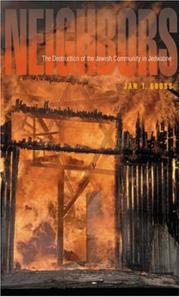
ISBN: 0691086672 9786613903365 1400843251 1283590913 Year: 2001 Publisher: Princeton (N.J.) : Princeton university press,
Abstract | Keywords | Export | Availability | Bookmark
 Loading...
Loading...Choose an application
- Reference Manager
- EndNote
- RefWorks (Direct export to RefWorks)
One summer day in 1941, half of the Polish town of Jedwabne murdered the other half, 1,600 men, women, and children, all but seven of the town's Jews. Neighbors tells their story. This is a shocking, brutal story that has never before been told. It is the most important study of Polish-Jewish relations to be published in decades and should become a classic of Holocaust literature. Jan Gross pieces together eyewitness accounts and other evidence into an engulfing reconstruction of the horrific July day remembered well by locals but forgotten by history. His investigation reads like a detective story, and its unfolding yields wider truths about Jewish-Polish relations, the Holocaust, and human responses to occupation and totalitarianism. It is a story of surprises: The newly occupying German army did not compel the massacre, and Jedwabne's Jews and Christians had previously enjoyed cordial relations. After the war, the nearby family who saved Jedwabne's surviving Jews was derided and driven from the area. The single Jew offered mercy by the town declined it. Most arresting is the sinking realization that Jedwabne's Jews were clubbed, drowned, gutted, and burned not by faceless Nazis, but by people whose features and names they knew well: their former schoolmates and those who sold them food, bought their milk, and chatted with them in the street. As much as such a question can ever be answered, Neighbors tells us why. In many ways, this is a simple book. It is easy to read in a single sitting, and hard not to. But its simplicity is deceptive. Gross's new and persuasive answers to vexed questions rewrite the history of twentieth-century Poland. This book proves, finally, that the fates of Poles and Jews during World War II can be comprehended only together.
Jews --- Holocaust, Jewish (1939-1945) --- Juifs --- Holocauste, 1939-1945 --- History. --- Histoire --- Jedwabne (Poland) --- Jedwabne (Pologne) --- Ethnic relations. --- Relations interethniques --- -Jews --- -Hebrews --- Israelites --- Jewish people --- Jewry --- Judaic people --- Judaists --- Ethnology --- Religious adherents --- Semites --- Judaism --- Catastrophe, Jewish (1939-1945) --- Destruction of the Jews (1939-1945) --- Extermination, Jewish (1939-1945) --- Holocaust, Nazi --- Ḥurban (1939-1945) --- Ḥurbn (1939-1945) --- Jewish Catastrophe (1939-1945) --- Jewish Holocaust (1939-1945) --- Nazi Holocaust --- Nazi persecution of Jews --- Shoʾah (1939-1945) --- Genocide --- World War, 1939-1945 --- Kindertransports (Rescue operations) --- History --- Nazi persecution --- Persecutions --- Atrocities --- Jewish resistance --- -Ethnic relations --- -History --- -Yedwabne (Poland) --- Yedṿabnah (Poland) --- Ethnic relations --- Hebrews --- Yedwabne (Poland)
Book
ISBN: 0691093814 0691196656 0691655499 0691656916 140084438X Year: 1979 Publisher: Princeton (N.J.) : Princeton university press,
Abstract | Keywords | Export | Availability | Bookmark
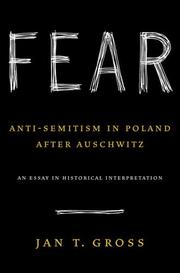
ISBN: 0375509240 Year: 2006 Publisher: New York Random House
Abstract | Keywords | Export | Availability | Bookmark
 Loading...
Loading...Choose an application
- Reference Manager
- EndNote
- RefWorks (Direct export to RefWorks)
Poland suffered an exceedingly brutal Nazi occupation during the Second World War. Close to five million Polish citizens lost their lives as a result. More than half the casualties were Polish Jews. Thus, the second largest Jewish community in the world& only American Jewry numbered more than the three and a half million Polish Jews at the time& was wiped out. Over 90 percent of its members were killed in the Holocaust. And yet, despite this unprecedented calamity that affected both Jews and non-Jews, Jewish Holocaust survivors returning to their hometowns in Poland after the war experienced widespread hostility, including murder, at the hands of their neighbors. The bloodiest peacetime pogrom in twentieth-century Europe took place in the Polish town of Kielce one year after the war ended, on July 4, 1946. Jan Gross's 'Fear' attempts to answer a perplexing question: How was anti-Semitism possible in Poland after the war? At the center of his investigation is a detailed reconstruction of the Kielce pogrom and the reactions it evoked in various milieus of Polish society. How did the Polish Catholic Church, Communist party workers, and intellectuals respond to the spectacle of Jews being murdered by their fellow citizens in a country that had just been liberated from a five-year Nazi occupation? Gross argues that the anti-Semitism displayed in Poland in the war's aftermath cannot be understood simply as a continuation of prewar attitudes. Rather, it developed in the context of the Holocaust and the Communist takeover: Anti-Semitism eventually became a common currency between the Communist regime and a society in which many had joined in the Nazi campaign of plunder and murder& and for whom the Jewish survivors were a standing reproach. Jews did not bring communism to Poland as some believe; in fact, they were finally driven out of Poland under the Communist regime as a matter of political expediency. In the words of the Nobel Prize& winning poet Czeslaw Milosz, Pola
Antisemitism --- Pogroms --- Jews --- Holocaust, Jewish (1939-1945) --- Communism --- Hebrews --- Israelites --- Jewish people --- Jewry --- Judaic people --- Judaists --- Ethnology --- Religious adherents --- Semites --- Judaism --- Genocide --- Massacres --- Anti-Jewish attitudes --- Anti-Semitism --- Ethnic relations --- Prejudices --- Philosemitism --- History --- Persecutions --- Influence. --- Poland --- Kielce (Poland) --- Ethnic relations. --- Influence --- Kelʹt︠s︡y (Poland) --- Kielce, Poland (City) --- Ḳilts (Poland) --- Ḳelts (Poland) --- Ḳeyltsah (Poland) --- Ḳeyltseh (Poland) --- קיילצה
Book
ISBN: 9789023425557 Year: 2007 Publisher: Amsterdam De Bezige Bij
Abstract | Keywords | Export | Availability | Bookmark
 Loading...
Loading...Choose an application
- Reference Manager
- EndNote
- RefWorks (Direct export to RefWorks)
Wereldoorlog --- Jodendom --- Antisemitisme --- Polen --- Kunst --- Literatuur --- Autisme --- Cultuur --- Kind --- Samenleving --- Technologie --- Wetenschap --- Historische kritiek --- Noorwegen --- Poëzie --- Maatschappij --- Vlaanderen --- Vlaams --- Emigratie --- Vrouw --- Geschiedenis --- Voorlichting
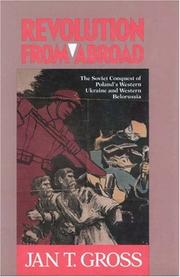
ISBN: 0691096031 9780691096032 Year: 2002 Publisher: Princeton : Princeton University Press,
Abstract | Keywords | Export | Availability | Bookmark
 Loading...
Loading...Choose an application
- Reference Manager
- EndNote
- RefWorks (Direct export to RefWorks)
Guerre mondiale (1939-1945) --- Relations --- Récits personnels polonais. --- Ukraine (ouest) --- Biélorussie --- Pologne --- World War, 1939-1945 --- Poland --- Ukraine, Western --- Belarus --- Soviet Union --- History --- Foreign relations
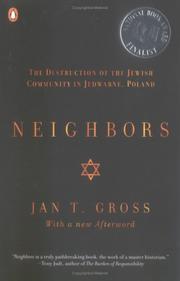
ISBN: 0142002402 Year: 2002 Publisher: New York, N.Y. : Penguin Books,
Abstract | Keywords | Export | Availability | Bookmark
 Loading...
Loading...Choose an application
- Reference Manager
- EndNote
- RefWorks (Direct export to RefWorks)
On a summer day in 1941 in Nazi-occupied Poland, half of the town of Jedwabne brutally murdered the other half: 1,600 men, women, and children-all but seven of the town's Jews. In this shocking and compelling study, historian Jan Gross pieces together eyewitness accounts as well as physical evidence into a comprehensive reconstruction of the horrific July day remembered well by locals but hidden to history. Revealing wider truths about Jewish-Polish relations, the Holocaust, and human responses to occupation and totalitarianism, Gross's investigation sheds light on how Jedwabne's Jews came to be murdered-not by faceless Nazis, but by people who knew them well.
Holocaust, Jewish (1939-1945) --- Jews --- World War, 1939-1945 --- History. --- Collaborationists --- Jedwabne (Poland) --- Ethnic relations.
Book
ISBN: 9788389129949 Year: 2007 Publisher: Kraków : Austeria,
Abstract | Keywords | Export | Availability | Bookmark
 Loading...
Loading...Choose an application
- Reference Manager
- EndNote
- RefWorks (Direct export to RefWorks)
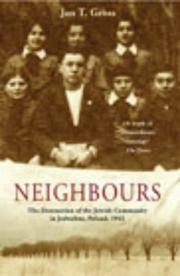
ISBN: 9780099441663 Year: 2003 Publisher: London Arrow Books
Abstract | Keywords | Export | Availability | Bookmark
 Loading...
Loading...Choose an application
- Reference Manager
- EndNote
- RefWorks (Direct export to RefWorks)

ISBN: 0691094330 0691096031 1400828384 Year: 1988 Publisher: Princeton, N.J. Princeton University
Abstract | Keywords | Export | Availability | Bookmark
 Loading...
Loading...Choose an application
- Reference Manager
- EndNote
- RefWorks (Direct export to RefWorks)
History of Eastern Europe --- anno 1930-1939 --- anno 1940-1949 --- Poland --- Russia
| Listing 1 - 10 of 53 | << page >> |
Sort by
|

 Search
Search Feedback
Feedback About UniCat
About UniCat  Help
Help News
News